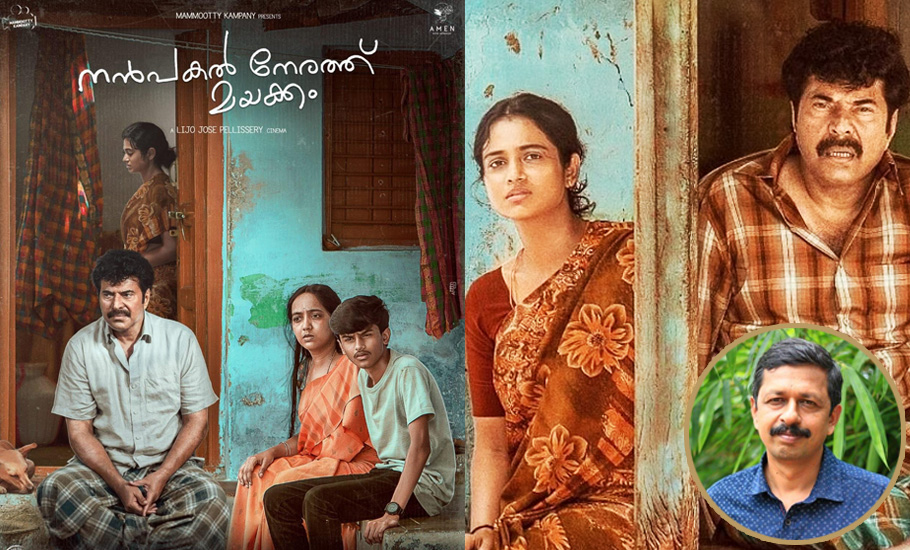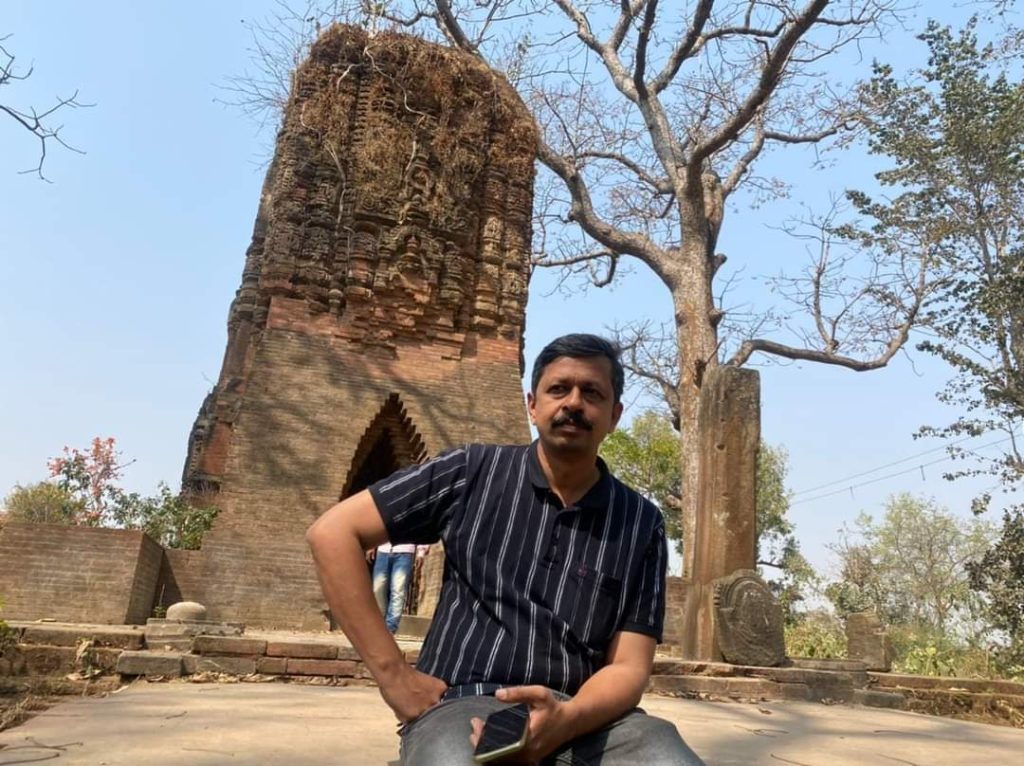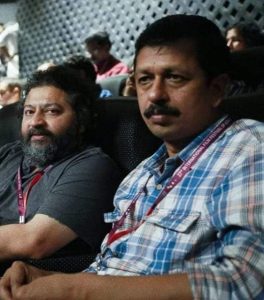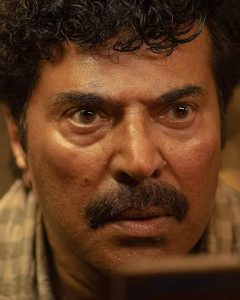
Nanpakal Nerathu Mayakkam is Lijo's vision and magic: Film's writer Hareesh
Each viewer has an interpretation for the Mammootty-starrer, and that speaks volumes about its appeal, says the writer

Whether it’s the raging bull in Jallikattu (2019) or the delusionary mind of James/Sundaram in Nanpakal Nerathu Mayakkam (‘An Afternoon Dream’, 2023), writer S Hareesh doesn’t hesitate to let his imagination run amok.
Directed by maverick Lijo Jose Pellissery and written by S Hareesh, Nanpakal Nerathu Mayakkam has become a talking point across the country, especially after its OTT release on Netflix.
Also Read: Riyas Komu interview: How art can be a site of political discourse, dissent
With a distinctive mise-en-scène and polyphonic sound design (Lijo’s masterstroke), the film with Mammootty in imperious form evokes a labyrinthine stream of thought, something which lingers on.
Far away from all the chatter, rather animated discussions on if it’s mayakkama or kalakkama (‘is it a dream or is my mind in a slush’), Hareesh is traversing the hinterland of West Bengal’s Purulia district — foraging new canopies, people, milieu and cuisine.

“I am travelling just to unwind myself and discover new geographies. I knew Nanpakal.. would trigger huge discussions and initiate wide-ranging discussions. That is what art is all about,” said Hareesh, who was on a local train to Purulia when The Federal reached him on the phone.
An acclaimed writer in Malayalam, his debut novel Meesha (‘Moustache’) won several awards, including the Sahitya Akademi and, later, the prestigious JCB Prize for Literature (English Translation). It’s his third work with Lijo — who Hareesh describes as someone who gives wings to his imagination — having worked in Jallikattu (India’s official entry at the 93rd Academy Awards) and the cryptic Churuli.
“Nothing like travelling to small towns, discovering markets and meeting new faces. Mostly, I use public transport and avoid typical tourist places. That way, I am no tourist per se, said Harish speaking in a hushed tone, quite dissimilar to the characters he imagines for the big screen.
On wild theories about who James is and what Sundaram does, all Hareesh had to say was: “It’s akin to throwing a stone into a lake. Ripples follow.”
As we publish excerpts from a long conversation with S Hareesh, the ripples are only getting wider, and wider.
Everyone is on an interpretation spree. How do you see the readings? Some of them are fascinating, some baffling. Do you analyse those readings?
(Laughs) I think art is [always] open to interpretation and, as creators, we are glad that people are making multiple readings of the film. Yeah, I may not be following all the comments being talked about and written about, but I do see some, and it’s really interesting. Let more discussions take place, and I think it’s another way of gauging your work. For makers, there is no greater joy than seeing their works travel wide and far.
What is your version or what exactly did Lijo seek in Nanpakal Nerathu Mayakkam?
(Pauses) I think what you are seeing on screen is Lijo Jose Pellissery’s vision. Readings are for others to decide. It’s like throwing a stone, and it’s natural that there will be ripples. It’s not exactly something in your control what follows next — and you need not control as well.
You are quite evasive, understandably so. Tell us how this whole project unfurled. All we know is that the seed is taken from an old TV advertisement. Tell us how you developed the life/dream of James/Sundaram.
It all started with a call from Lijo, who wanted to tell the story of a man’s journey to Tamil Nadu and his state of mind.
Also Read: Mangaluru Days: Why Kannada director Raj B Shetty is the talk of the country
How familiar are Tamil Nadu and its culture for you?
I travel a lot, and Tamil Nadu is one of my favourite places [to tour]. And yes, I closely follow their culture and, of course, food. In fact, Lijo was more familiar with the Tamil milieu since his maternal grandfather hailed from Tamil Nadu. Guess the grandfather’s name? James!
So it could have been easy for you to write and place the film in Tamil Nadu. Have you done a recce where Nanpakal Nerathu Mayakkam was shot (near Palani in TN’s Dindigul district)?
Not when I wrote, but later when we went location hunting, I did take considerable time. Again, I would not say it was easy for me to write the Tamil part, but it was an experience I cherish forever. I must credit Jayakumar Mankuthirai for his immense help with Tamil dialogues.
With songs and dialogues from Tamil films always playing in the background, the sound design was unique. Was this something you all thought of at the script level itself?
Again, it was discussed early in the process, and it’s all part of Lijo’s larger scheme of things. That is why I keep saying film-making is a long, continuous process even after it is shot. Here, we should not forget editor Deepu Joseph’s terrific contribution.

You are primarily a writer who later moved to cinema. How did you make the transition so successfully and in no time?
It was my friend Sanju Surendran who made Aedan (2017) by combining three of my short stories from my anthology titled Aadam. Then Lijo called me after having read my short story Maoist from the same work, and that was Jallikattu, where Lijo threw open a new world for me. Frankly, there has been no looking back.
What Lijo brings to the table is unbelievable stuff. Only a visionary like Lijo can take a tiny thread from a story or even an advertisement and transform it into something absolutely magical. For instance, as we have already discussed, Jallikattu was based on my story, but what Lijo made was something way beyond my expectations. Such is the transition that when I think of my own story, the images Lijo created come to my mind, not exactly what I wrote. I found it really amusing.
Tell us about Lijo, who is quite a mystery — well, almost like his films.
Probably, he is comfortable with a close set of people, and the perception about him being a recluse and all surfaces. Most of his friends are from outside the industry, and he still likes to hang out with them. Unlike most filmmakers, he is a voracious reader as well. On the sets, he is a different person, though, with the director in him in total control. He is one who breathes films 365 days, 24/7. I really enjoy my evenings and conversations with him.
Also Read: Why Malayalam director Sathyan Anthikad does not get rattled by RRR/KGF
Invariably, there is a talk about certain ‘Lijo brilliance’ in whatever he does. Do you think the director walks away with all the credit while writers (like you) are not getting the attention probably you/they deserve?
If anyone deserves the credit, it’s certainly Lijo. In fact, I think there are some occasions where I get undue credit, which should ideally go to Lijo himself. So, no complaints at all. A film belongs to the director. Period.
What is your favourite scene in Nanpakal Nerathu Mayakkam?
There are many. Yet, that scene where the two families are shown together in one single frame. Absolute magic.
And your favourite Mammootty moment?
That entire sequence where they are trying to overpower him, and then finally, he falls to the ground uttering, “This is my soil and this is where I belong.”
There are some scenes where he lifted the entire narrative to another sphere altogether. A sheer delight to watch.

You once said the novel is like a Test cricket while short story is like one-day. Going by the same analogy, a film script has to be T20?
(Laughs) I don’t think we can compare films to T20 cricket, first of all. Unlike short story or novels, screenwriting or filmmaking is a collective process where you can’t seclude yourself and create what you want. Still, it’s no easy process, and it does come with its own challenges, but during the filmmaking process, it gets embellished with every department [it sometimes changes even at the editing table], chipping in at regular intervals. That way, it’s a total team game, compared to, say, writing a novel.
Do you watch cricket, or other sports? How do you spend time when you are not writing?
I would watch cricket a lot in the 1990s when the game was more or less an equal contest between batters and bowlers. Remember, we had the likes of bowlers like Wasim Akram, Courtney Walsh and [earlier] Malcolm Marshall. Over the years, cricket has turned into a batters’ game, with every possible rule having been tweaked in favour of them. Will you change the width of the goalpost to score so that more goals will be scored in football? Or would you take the off-side rule off? It’s akin to that. So, I have lost interest in cricket big time. The cricket I love is just not scoring a mountain of runs.
Talking about the evolution of sports, even the concept of arts has changed. These days every word written is being closely watched and dissected through multiple prisms — be it gender or political. Do you measure every word you write? Your Churuli was on the brink of getting banned for its ‘abusive’ language. Are writers increasingly under pressure “to be politically correct”?
Most of my works are political, and frankly, I have not felt any pressure whatsoever. What the characters in the film speak need not always be the point of view of the writer. To answer your query, I don’t measure every word and, if you do start doing so, then you probably can’t write. In life, you try to be politically correct, and I would say even that is tough.
Also Read: Amal Neerad interview : ‘In creativity, Malayalam films can match any industry’
Back to scripts, tell us some of your favourite films/scripts in Malayalam.
I don’t follow films that closely [perhaps of late I do], so I cannot claim to have seen many films made in Malayalam or elsewhere. If I need to really pick, then Kottayam Kunjachan or even Rajamanikkam.
Kottayam Kunjachan? Surprising choice.
Why? I am a sucker for commercial films, and I guess primarily cinema needs to entertain filmgoers.
Ironically, your films are in total contrast to what you just said.
That’s because Lijo wanted me to work on those stories, and I must pander to his vision. As I have already said, he is the master.
So are you open to writing full-blown commercial potboilers?
In the works.
Also Read: The Amal Neerad interview: On Mammootty, Bheeshma Parvam and Bilal


